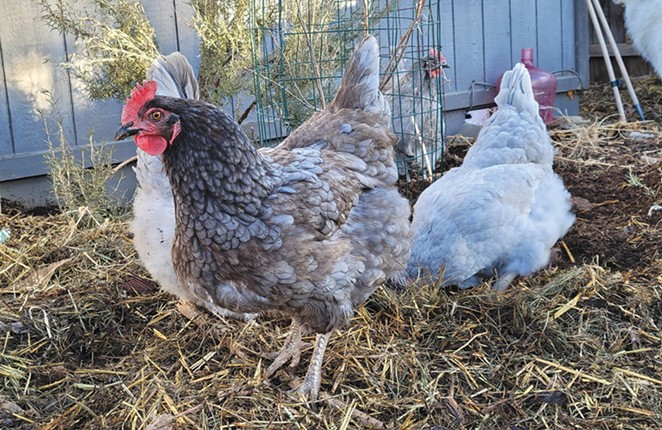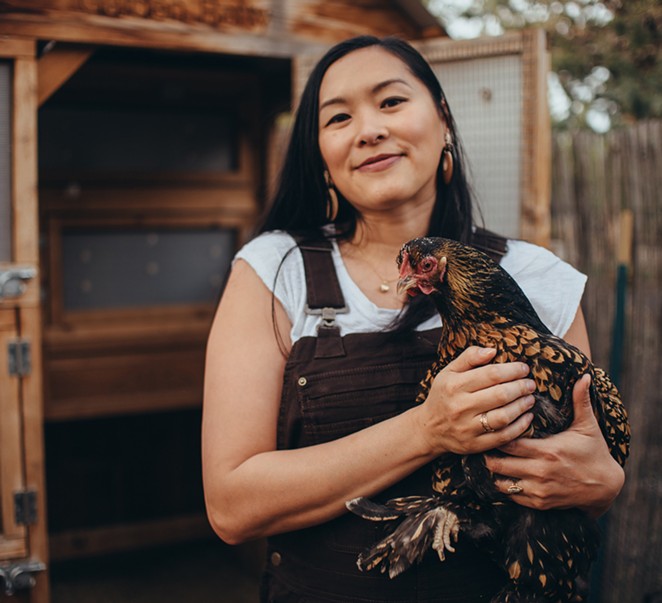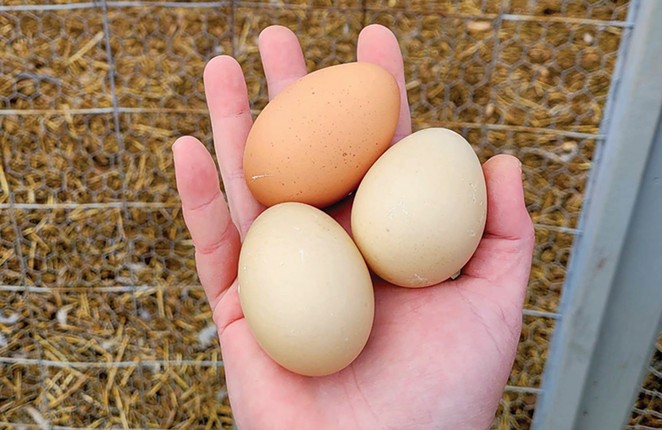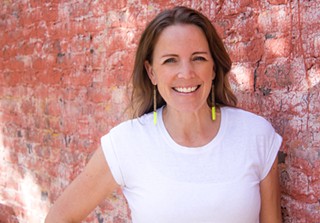Heading to the egg section of any local grocery store, shoppers may find one of two things: A sign boasting the relatively low price of eggs and the quantity now in stock... or a sign lamenting the fact that no eggs are available at all. If it's the former, the sign is also likely to include instructions on how many cartons one customer is allowed to buy. Just like the toilet paper, Tylenol and cleaning products of pandemic days gone by, securing eggs is the latest supply-chain headache to hit the American consumer.
The egg shortage, then, is also introducing another shortage on local store shelves: A shortage of baby chicks at feed stores. When times get tough, more people turn to the notion of "growing their own."
"Ever since the pandemic, people have been flocking to backyard poultry keeping," stated Sarah Green, admin of the Facebook group, Central Oregon Gardening & Poultry, who also runs a YouTube channel, Green Lady Permaculture. "The egg supply chain issues from this winter have just seemed to convince more people that they need to add an egg layer of some kind. Everything from little tiny quail, all the way up to very large turkeys and geese, but the most popular has always been chickens."
Avian Influenza in Oregon and beyond
Like the supply shortages during the COVID-19 pandemic, this current egg shortage also stems from a virus – but not one that has been shown to widely affect human health.
An outbreak of highly pathogenic avian influenza — commonly called bird flu — around the world, and first identified in wild birds in January 2022, has since been identified in all 50 states, affecting more than 58 million commercial and backyard flocks, according to the Centers for Disease Control and Prevention. In Central Oregon, the outbreak has caused some culling of local flocks.
Flocks get the virus when wild birds interact with domesticated ones, said Kristine Carter, district veterinarian at the Oregon Department of Agriculture who serves the northeast region of the state.
"Here in Oregon, we have seen that most cases have been in conjunction with domesticated and wild waterfowl intermingling with one another and then bringing the virus back to gallinaceous birds such as chickens, turkeys and guinea fowl," Carter told the Source Weekly. "Waterfowl in general can harbor the virus for three to four months in their fecal material and then contaminate the environment and water sources. However, they're not as symptomatic/clinically ill as turkeys and other land fowl."
As a chicken keeper myself, I first learned of the current outbreak in July, when the Oregon Department of Agriculture issued a regional quarantine in response to the discovery of HPAI in a backyard flock of chickens and ducks in Deschutes County. At that time, ODA had found 11 cases of HPAI in five Oregon counties, with six of them stemming from Deschutes County. Four flocks were backyard producers who sold eggs to the public. That quarantine was lifted Aug. 17, 2022, but ODA's Avian Influenza page continues to list outbreaks from around the state as recently as January, with all listed outbreaks stemming from backyard producers. The last case reported in Deschutes County happened last November, according to ODA's reporting.
"At this point, we're still seeing cases," Carter from ODA said. "Unfortunately, I don't think it's going to go away anytime soon. In the area of Deschutes County, the biggest risk is that a lot of people have domesticated waterfowl that intermingle with the wild waterfowl, thus spreading it to their flock."
The intermingling often happens at properties with a water feature, Carter said.
"A lot of people have a pond on their property, and they have domesticated ducks that they let go on that pond which is also inhabited by wild waterfowl, and then their pet ducks intermingle with those wild waterfowl and then they bring that virus back into the chicken flock," Carter said. "That's when they experience the mortality rates."
For those who don't have a water feature, the risk isn't zero — but it's lower, she said.
"The risk should be significantly lower if they do not have pet ducks and their chickens are completely enclosed and they're not having full access to pasture. Theoretically, we should have a lower incidence of them getting avian influenza."
The Backyard Producers
For those who value their morning dose of quality protein — about 6 to 8 grams per egg — seeing empty store shelves has prompted them to skip the supply chain and to produce their own eggs.
As a result, local Facebook groups, like the above-mentioned Central Oregon Gardening & Poultry, and Central Oregon Chickens 101, have been filled with inquiries about everything from raising and finding chicks locally, to the ins and outs of chicken rearing.
For Central Oregon resident Linda Ly, who maintains the popular garden and urban homesteading blog, Garden Betty, giving advice about chicken keeping is a regular thing. I sat down with Ly recently to ask for some of her tips on raising chickens for the newbie.
"The first thing I always tell them is to make sure you're not squeamish about chickens, because it's not like having a dog or a cat. Even though chickens are rather low maintenance, their needs — because they are a farm animal — tend to be more messy," Ly said. "There's going to be some kind of issue with your chicken, and you're not going to take it to a vet. Honestly, for most things that you have to deal with — whether it's like a poopy butt or maybe an egg that stuck in its vent or even mites — there's just so many things that happen with chickens because they live outside."
For Ly, raising chickens and growing her own food are parts of a chosen lifestyle that began long before the world woke up to the pains of a global supply chain. Part of the allure for me is a marked difference between eggs grown at home and those bought from the store — though Ly wasn't exactly convinced that the flavor factor is real.
"I think a lot of flavor is also going to be psychological, because what you grow, and what you raised on your own is always going to taste better than what you buy, just because you put your heart and soul into it. A lot of our perception, I think, of flavor and that type of experience comes from what we put into it as well. I guess that's just like so many things, not just flavor," she said. "I'm a very visual person. So when I compare a store-bought egg to my own egg, just the act of cracking it... our eggs are so much thicker. When you look at the yolks, ours are just so round, so firm and the whites are a lot thicker compared to a store-bought egg, which is going to be a little bit paler in color. It's a little bit runny. You don't really know how old that egg is, but with your own egg, you always know how old it is."
Ly and her family currently have a flock of four chickens in Deschutes River Woods. Four is the max allowed for households within the Bend city limits (though Ly's property is outside that zone). City rules also prohibit roosters.
"We let our chickens free range on our property. We do leave them grains and seeds, and we give them grubs as their treat, but we pretty much let them fend for themselves," Ly described. "They have free range of an acre on our property, and they dig for all kinds of worms and grasshoppers and whatever's in the ground. We also give them all of our kitchen scraps. We produce a ton of veggie and fruit scraps from our kitchen, and all of it goes to the chickens."
Over at the Central Oregon Gardening & Poultry Facebook group, group admin Green gives out plenty of wisdom to the noobs who join to get help and advice.
One of her first pieces of advice: Don't think this is going to save you money.
"Some people seem to think that keeping chickens is cheaper than buying eggs," Green wrote via Facebook message. "Sorry to say, it's really not, not for the first few years at least. Housing, fencing and feed are not cheap anymore. If you can DIY the fencing and coop, it can save you lots."
From my personal experience, the math does begin to work in one's favor after the initial setup. I spend about $25 per month on organic layer feed for my three birds, who also have about 1/3 of a backyard in which to free range for whatever's around. For me, the initial setup included purchasing and modifying an insulated doghouse from a farmer who was offloading it for $30, to which I added nesting boxes and a raised platform using wood I salvaged. A $200 automatic door that opens and closes at dawn and dusk made me less beholden to the time constraints of urban farming. In exchange, I get two to three eggs a day, or 60 to 90 per month. Presuming a cost of $6 per dozen for organic, free-range eggs at the store, I'm coming out ahead, mostly.
Ly of Garden Betty added a bit of her own advice about getting started:
"If you're just starting out, I think it's perfectly acceptable and probably the best idea to start off smaller. Our first coop was built entirely with random salvaged lumber just because we wanted to make sure that chicken keeping was really for us. We were limited by how many chickens we could keep — down in L.A. [where Ly lived with her husband prior to moving to Bend] the limit was three or four. And so we built the coop exactly to fit three or four chickens. Because the problem is, if you go too big, and you're only filling it with three or four chickens, then it's really hard to keep them warm in the winter, even if they're all huddled together."
Green raises both chickens and ducks on about 1/5 of an acre in Redmond, sharing her knowledge on both the group and her YouTube page. She summed up her basic advice:
"Main things people should know is... 1. Chickens are great, but all breeds are very different. Some lay more eggs than others, some are divas and some are louder than others. Research a lot. 2. Even in our area, never use a heat lamp after they are full grown. Houses burn down each year because of heat lamps. Heat panels are safer, but they don't need heat. Chickens just need a draft free coop, a little space to roam around and food and water daily. 3. Roosters are not allowed in town! They are loud and can be aggressive," Green advised. "Not all chicks you buy will turn out to be hens. You can buy pullets (young female chickens), but it's not guaranteed, unless you get what is called a sexlink. That is a chicken that has markings at hatch that are gender dependent. If you end up with roosters, you may have to find them a new home or a stew pot. That can be hard, but it's part of keeping backyard birds."
Protecting Your Flock
Tips from Oregon Department of Agriculture District Veterinarian Kristine Carter
Biosecurity is super important — making sure you have a closed flock and you don’t hang out with other birds or bring other birds back. If you're going to bring other birds, do a 30-day quarantine. You handle those birds last, you handle your flock first. Also, make sure you're buying birds from a reputable source. A hatchery is a good option. Or the feed store (all those come from the hatchery.) There is a concern not just for avian influenza — it has some zoonotic potential — but also salmonella. Every chicken has salmonella, so ensure proper egg washing and hygiene — washing hands. If you have little kids, make sure they are cleaning their hands properly. And boots, being cognitive of where your shoes have been. It’s always a good idea to have a designated pair of chicken shoes that you just wear into that coop. I recommend going to the feed store and getting those cheap rubber boots that you can just leave at the coop. Just slip those on, and those are your coup shoes, and then you put the shoes on that you want to do other things in.
“We recommend that they [chickens] stay in a coop or in a covered area that can completely be enclosed. Not for the darkness, but to prevent wild waterfowl from interacting with those birds,” Carter said.




























